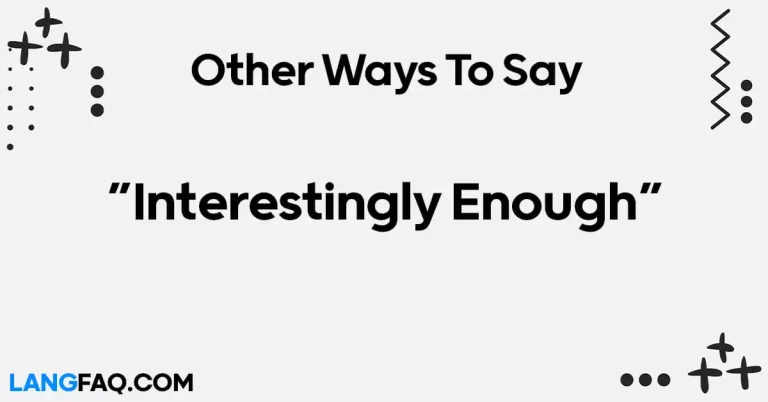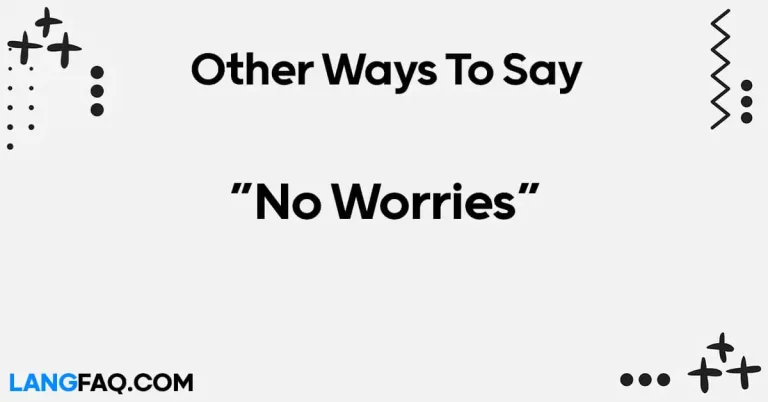Welcoming others with warmth and politeness is a cornerstone of effective communication. In this article, we’ll explore various ways to articulate “My Pleasure to Help,” adding richness and diversity to your expressions. Mastering these alternatives will not only make your conversations more engaging but also showcase your linguistic prowess. Let’s delve into the art of expressing willingness to assist in different shades.
12 Other Ways to Say “My Pleasure to Help”
Here are 12 other ways to say “My Pleasure to Help”:
- Delighted to Assist
- Always at Your Service
- Happy to Be of Service
- It’s My Delight to Help You
- Absolutely, I’m Here for You
- Nothing Brings Me More Joy
- It’s a Pleasure Offering My Support
- Count on Me Anytime
- I’m Here to Assist Whenever You Need
- Your Request Brings Me Joy
- Always Ready to Lend a Hand
- Feel Free to Reach Out – I’m Here
Here is a table with meanings and examples for the 12 different ways to say “My Pleasure to Help”:
| Expression | Meaning | Example |
|---|---|---|
| Delighted to Assist | Expressing genuine joy in helping | “I’m delighted to assist you with your project.” |
| Always at Your Service | Assuring continuous support | “You can count on me—I’m always at your service.” |
| Happy to Be of Service | Conveying eagerness to help | “I’m happy to be of service whenever you need.” |
| It’s My Delight to Help You | Emphasizing personal joy in assisting | “It truly is my delight to help you succeed.” |
| Absolutely, I’m Here for You | Affirming availability and support | “Absolutely, I’m here for you in any situation.” |
| Nothing Brings Me More Joy | Highlighting fulfillment in helping | “Nothing brings me more joy than assisting others.” |
| It’s a Pleasure Offering My Support | Expressing pleasure in providing support | “It’s a pleasure offering my support whenever needed.” |
| Count on Me Anytime | Promising reliability and accessibility | “You can count on me anytime you require assistance.” |
| I’m Here to Assist Whenever You Need | Communicating ongoing availability | “I’m here to assist whenever you need a helping hand.” |
| Your Request Brings Me Joy | Linking joy to receiving requests | “Your request brings me joy—I’m ready to assist.” |
| Always Ready to Lend a Hand | Signifying perpetual readiness to help | “I’m always ready to lend a hand when you need it.” |
| Feel Free to Reach Out – I’m Here | Encouraging open communication | “Feel free to reach out – I’m here to help whenever.” |
These alternative expressions not only convey a willingness to help but also add a personal touch to your interactions. Whether you’re expressing joy, reliability, or perpetual readiness, each phrase contributes to creating a positive and enriching experience in your communication.
Is It Correct to Say “My Pleasure to Help”?
Yes, “My Pleasure to Help” is a grammatically correct and polite expression. It is a courteous and friendly way to respond when someone expresses gratitude or appreciation for your assistance. This phrase is often used in customer service, hospitality, or everyday interactions to convey that helping was not just a duty but something that was genuinely enjoyable.
Example Usage:
- Scenario 1: Professional Setting
- Colleague: “Thank you for reviewing the report and providing feedback.”
- You: “My pleasure to help. If you have any more questions, feel free to ask.”
- Scenario 2: Casual Interaction
- Friend: “I appreciate you helping me move this weekend.”
- You: “No problem at all, my pleasure to help. We make a great moving team!”
Using such expressions not only acknowledges the gratitude but also adds a positive and personable touch to your response. It signifies a willingness to assist with a friendly and approachable demeanor.
Professional Mail Example With “My Pleasure to Help”
Subject: Assistance with Your Inquiry
Dear [Recipient’s Name],
I trust this email finds you well.
I wanted to follow up on your recent inquiry regarding [specific topic]. It was my pleasure to help with your questions and provide the necessary information.
Should you have any further queries or require additional assistance, please don’t hesitate to reach out. My goal is to ensure that you have all the information you need to [achieve your goal/solve your problem/etc.].
Thank you for choosing [Your Company/Organization], and it remains my pleasure to help in any way possible.
Best regards,
[Your Full Name] [Your Position] [Your Contact Information]
Delighted to Assist: Infusing Joy into Support
Expressing a sincere willingness to help is crucial in both professional and personal contexts. The phrase “Delighted to Assist” goes beyond a mere acknowledgment; it conveys genuine joy in being of service.
Usage: In a professional setting, using “Delighted to Assist” can elevate your customer service interactions. For instance, when responding to a client’s query, you might say, “I’m delighted to assist you with any further information you need regarding our services.”
Variations:
- Colleagues: “Delighted to assist, how can I support you in this project?”
- Friends: “I’m always delighted to assist – what can I help you with today?”
Example Sentence: “Delighted to assist, your success is our priority.”
Email Sample:
Subject: Delighted to Assist You
Dear [Client/Colleague/Friend],
I hope this email finds you well. I wanted to express that I am delighted to assist you with any questions or concerns you may have regarding [specific topic/project]. Please feel free to reach out at your convenience.
Best regards, [Your Name]
Always at Your Service: Assurance of Continuous Support
“Always at Your Service” is a timeless expression that assures others of your unwavering availability and support. It’s a commitment to being a reliable resource whenever needed.
Usage: In a professional context, this phrase can be used to reassure a client. For instance, “You can count on us – we’re always at your service to provide the support you require.”
Variations:
- Formal: “Rest assured, I am always at your service for any business-related inquiries.”
- Casual: “Hey, always at your service – how can I help you today?”
Example Sentence: “Your satisfaction is our priority; we are always at your service.”
Email Sample:
Subject: Always at Your Service
Dear [Client/Colleague],
I want to remind you that I am always at your service for any assistance you may need. Please don’t hesitate to reach out if there’s anything I can help you with.
Best regards, [Your Name]
Happy to Be of Service: Conveying Eagerness in Assistance
Expressing happiness in helping others is a powerful way to convey your eagerness to be of service. “Happy to Be of Service” creates a positive atmosphere in your interactions.
Usage: Use this phrase in a professional email to convey your enthusiasm. For example, “I’m happy to be of service and provide guidance on your upcoming project.”
Variations:
- Mentor-Mentee: “As your mentor, I’m happy to be of service in guiding you through this learning journey.”
- Friends: “Whenever you need a hand, I’m happy to be of service – just give me a call!”
Example Sentence: “Happy to be of service – your success is our shared achievement.”
Email Sample:
Subject: Happy to Be of Service
Dear [Recipient],
I wanted to let you know that I am happy to be of service whenever you need assistance. Your success is important to me, and I’m here to support you in any way I can.
Best regards, [Your Name]
It’s My Delight to Help You: Emphasizing Personal Joy in Assistance
Adding a personal touch to your expressions of assistance can make your interactions more meaningful. “It’s My Delight to Help You” emphasizes the joy derived from aiding others.
Usage: In a formal setting, this phrase can be used with clients or colleagues. For example, “Allow me to handle that for you; it’s genuinely my delight to help you navigate through this issue.”
Variations:
- Manager to Team: “Team, it’s my delight to help you achieve your goals – let’s collaborate for success.”
- Casual: “Friend, it’s my delight to help you move this weekend – I’ll be there bright and early!”
Example Sentence: “It’s my delight to help you succeed, and I’m committed to supporting you every step of the way.”
Email Sample:
Subject: It’s My Delight to Help You
Dear [Client/Colleague/Friend],
I trust this email finds you well. It’s genuinely my delight to help you with any challenges or questions you may have. Please feel free to reach out, and I’ll be more than happy to assist.
Warm regards, [Your Name]
Absolutely, I’m Here for You: Affirming Availability and Support
Sometimes, a simple affirmation of presence can provide comfort. “Absolutely, I’m Here for You” communicates unwavering availability and support.
Usage: In a professional context, use this phrase to reassure a colleague or client. For instance, “Absolutely, I’m here for you if you need any assistance with the upcoming presentation.”
Variations:
- Formal Email Sign-off: “Thank you for your trust in our services. Absolutely, I’m here for you for any future collaborations.”
- Friend in Need: “Absolutely, I’m here for you – let’s grab a coffee and talk about it.”
Example Sentence: “Your success matters to me; absolutely, I’m here for you through thick and thin.”
Email Sample:
Subject: Absolutely, I’m Here for You
Dear [Client/Colleague/Friend],
I wanted to reach out and remind you that absolutely, I’m here for you. Whether it’s work-related or personal, don’t hesitate to let me know how I can support you.
Warm regards, [Your Name]
Nothing Brings Me More Joy: Highlighting Fulfillment in Helping
Linking the act of helping to personal joy creates a positive and fulfilling dynamic. “Nothing Brings Me More Joy” emphasizes the rewarding nature of assistance.
Usage: In a team setting, express this phrase to motivate and inspire. For instance, “Nothing brings me more joy than seeing our team succeed. Let’s work together to achieve our goals.”
Variations:
- Family Support: “Nothing brings me more joy than being able to support my family – it’s what matters most.”
- Informal Work Setting: “Colleagues, nothing brings me more joy than collaborating with such a talented team.”
Example Sentence: “Your accomplishments are my joy; nothing brings me more joy than seeing you thrive.”
Email Sample:
Subject: Nothing Brings Me More Joy
Dear [Team/Client/Family],
I wanted to share that nothing brings me more joy than witnessing your achievements. Your success is a source of inspiration, and I’m here to support you in reaching even greater heights.
Warm regards, [Your Name]
It’s a Pleasure Offering My Support: Expressing Pleasure in Providing Assistance
Conveying pleasure in providing support adds a touch of warmth to your interactions. “It’s a Pleasure Offering My Support” communicates a genuine and comforting willingness to assist.
Usage: In a client-facing role, express this phrase to enhance the customer experience. For example, “It’s a pleasure offering my support in resolving any concerns you may have with our services.”
Variations:
- Formal Setting: “To our valued clients, it’s a pleasure offering my support in ensuring your satisfaction with our products.”
- Casual Interaction: “Friend, it’s always a pleasure offering my support – what can I do for you today?”
Example Sentence: “Client satisfaction is our priority; it’s a pleasure offering my support whenever you need assistance.”
Email Sample:
Subject: It’s a Pleasure Offering My Support
Dear [Client/Colleague/Friend],
I trust this email finds you well. It’s genuinely a pleasure offering my support. Please feel free to reach out if there’s anything I can assist you with.
Warm regards, [Your Name]
Count on Me Anytime: Promoting Reliability and Accessibility
Promising reliability and accessibility is crucial in building trust. “Count on Me Anytime” assures others that you are a dependable resource whenever they need assistance.
Usage: In a leadership role, express this phrase to build trust among team members. For instance, “Team, you can count on me anytime for guidance and support as we navigate through this project.”
Variations:
- Mentor to Mentee: “As your mentor, count on me anytime you need advice or assistance in your professional journey.”
- Friends and Family: “Count on me anytime, whether it’s for a listening ear or practical support – I’m here for you.”
Example Sentence: “Reliability is the cornerstone of our collaboration; count on me anytime for unwavering support.”
Email Sample:
Subject: Count on Me Anytime
Dear [Team/Colleague/Friend],
I wanted to remind you that you can count on me anytime for support. Your success is important, and I’m here to assist in any way I can.
Best regards, [Your Name]
I’m Here to Assist Whenever You Need: Communicating Ongoing Availability
Expressing ongoing availability fosters a sense of security. “I’m Here to Assist Whenever You Need” reinforces your commitment to being a helpful resource.
Usage: In a professional context, use this phrase to reassure clients or colleagues. For example, “Feel free to reach out – I’m here to assist whenever you need guidance on our services.”
Variations:
- Team Collaboration: “Team, I’m here to assist whenever you need support in achieving our project goals.”
- Personal Support: “Friend, I’m here to assist whenever you need someone to talk to – I value our friendship.”
Example Sentence: “Your success is my priority; I’m here to assist whenever you need guidance or support.”
Email Sample:
Subject: I’m Here to Assist Whenever You Need
Dear [Client/Colleague/Friend],
I hope this email finds you well. Just a reminder that I’m here to assist whenever you need guidance or support. Don’t hesitate to reach out.
Warm regards, [Your Name]
Your Request Brings Me Joy: Connecting Assistance to Personal Happiness
Linking joy to receiving requests creates a positive and collaborative atmosphere. “Your Request Brings Me Joy” conveys a sense of fulfillment derived from helping others.
Usage: In a team environment, use this phrase to encourage open communication. For instance, “Team, your requests bring me joy – let’s continue working together to achieve our goals.”
Variations:
- Colleagues: “Colleagues, your requests bring me joy – I’m here to support our collective success.”
- Personal Connections: “Friend, your requests bring me joy, and I’m always ready to lend a hand whenever you need.”
Example Sentence: “Mutual success is our joy; your requests bring me joy and drive our collaborative efforts.”
Email Sample:
Subject: Your Request Brings Me Joy
Dear [Team/Colleague/Friend],
I wanted to express that your requests bring me joy. It’s a pleasure to contribute to our shared success, and I’m always here to support you.
Best regards, [Your Name]
Always Ready to Lend a Hand: Signifying Perpetual Readiness to Help
Expressing perpetual readiness to assist creates a reliable and supportive image. “Always Ready to Lend a Hand” communicates a commitment to being there whenever needed.
Usage: In a professional setting, use this phrase to convey dedication to your team or clients. For example, “Clients, rest assured, I’m always ready to lend a hand in addressing any concerns you may have.”
Variations:
- Mentor-Mentee: “As your mentor, know that I’m always ready to lend a hand in guiding you through your professional journey.”
- Friendship: “Friend, I’m always ready to lend a hand – count on me whenever you need support.”
Example Sentence: “Reliability defines us; I’m always ready to lend a hand, ensuring your success is our shared achievement.”
Email Sample:
Subject: Always Ready to Lend a Hand
Dear [Client/Colleague/Friend],
I trust this message finds you well. Just a reminder that I’m always ready to lend a hand whenever you need assistance or support. Your success is important to me.
Warm regards, [Your Name]
Feel Free to Reach Out – I’m Here: Encouraging Open Communication
Encouraging open communication is essential for effective collaboration. “Feel Free to Reach Out – I’m Here” creates a welcoming environment, emphasizing approachability.
Usage: In a leadership role, express this phrase to foster a culture of open communication among team members. For example, “Team, feel free to reach out – I’m here to address any concerns or ideas you may have.”
Variations:
- Colleagues: “Colleagues, feel free to reach out – let’s collaborate to ensure the success of our project.”
- Friends and Family: “Feel free to reach out – I’m here to support you in any way you need.”
Example Sentence: “Open communication is our strength; feel free to reach out – I’m here to ensure your needs are met.”
Email Sample:
Subject: Feel Free to Reach Out – I’m Here
Dear [Team/Colleague/Friend],
I hope this email finds you well. I wanted to remind you to feel free to reach out – I’m here for any questions, concerns, or support you may need.
Best regards, [Your Name]
Frequently Asked Questions
How Can I Politely Offer Help Without Sounding Insincere?
Offering assistance sincerely is an art. Acknowledge the need for genuine intent and learn how to convey it effectively.
Are These Alternatives Appropriate in Formal Settings?
Explore the versatility of these phrases and understand when to employ them in formal contexts for optimal impact.
Can I Mix and Match These Expressions?
Discover the flexibility of language by combining different alternatives, adding a personal touch to your responses.
Do These Alternatives Work in Written Communication?
Uncover the adaptability of these expressions in written form, enhancing your written communication skills.
How Can I Ensure My Responses Are Genuine?
Authenticity is key. Learn strategies to ensure your expressions of assistance are always sincere and well-received.
Are These Alternatives Universally Understood?
Explore the cross-cultural applicability of these phrases, ensuring effective communication across diverse audiences.
Conclusion
Mastering alternative expressions for “My Pleasure to Help” adds depth and sincerity to your communication. Whether in spoken or written form, these alternatives showcase your commitment to assisting others with genuine enthusiasm. Elevate your interactions, create lasting impressions, and make every exchange a positive and enriching experience.







